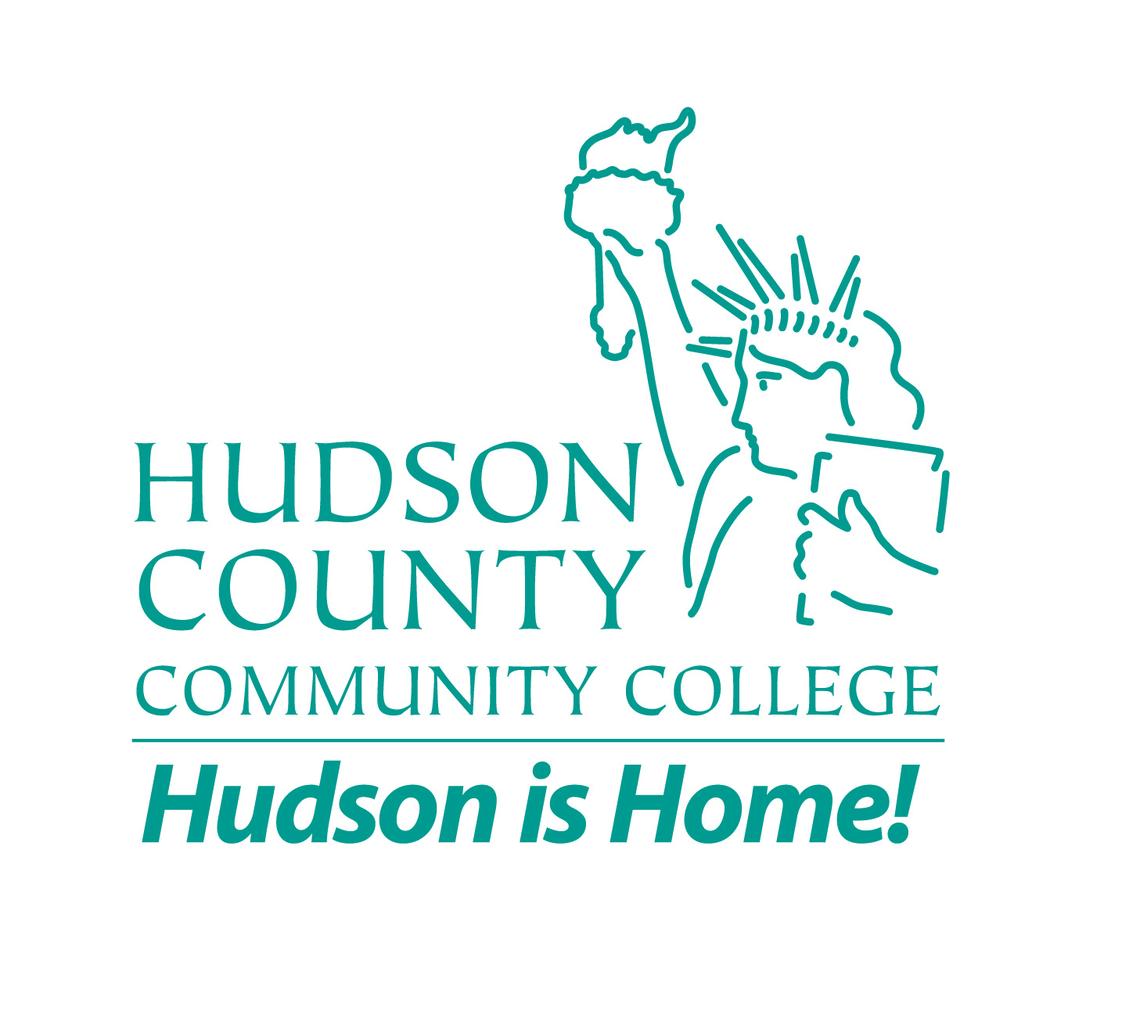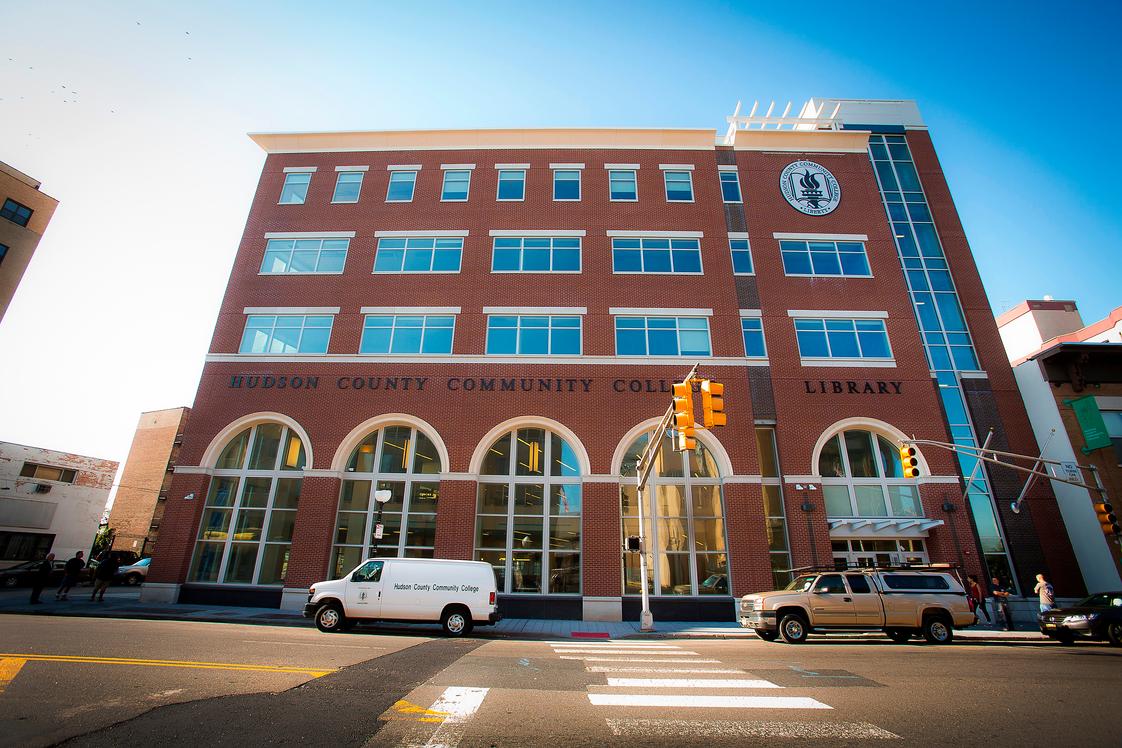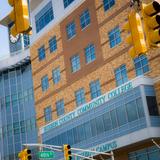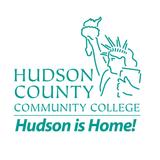- Hudson County Community College has come to be recognized as a valuable community asset where residents can receive a high quality education, at an affordable price, close to home. The College enjoys full and unrestricted general accreditation from the Middle States Association, and programs in nursing, culinary arts and technology have received specialized professional certifications.
School Highlights
Hudson County Community College serves 10,169 students (43% of students are full-time).
The college's student:teacher ratio of 23:1 is higher than the state community college average of 19:1.
Minority enrollment is 87% of the student body (majority Hispanic), which is more than the state average of 65%.
Quick Stats (2025)
- Enrollment: 10,169 students
- In-state tuition: $5,020
- Out-state tuition: $8,740
- Student:teacher ratio: 23:1
- Minority enrollment: 87%
- Source: Verified school update
Top Rankings
Hudson County Community College ranks among the top 20% of public schools in New Jersey for:
School Overview
The teacher population of 445 teachers has stayed relatively flat over five years.
Hudson County Community College
(NJ) Community College Avg.
Carnegie Classification
Associate's Colleges: Mixed Transfer/Career & Technical-High Traditional
Baccalaureate Colleges: Diverse Fields
Institution Level
At least 2 but less than 4 years
At least 2 but less than 4 years
Institution Control
Public
Private not-for-profit
Total Faculty
445 staff
439 staff
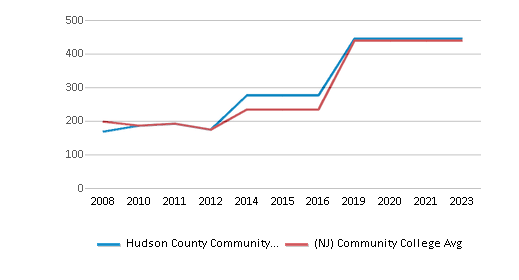
Number of Programs Offered
91
39
School Calendar
Student Body
The student population of Hudson County Community College has grown by 44% over five years.
The student:teacher ratio of 23:1 has increased from 16:1 over five years.
The Hudson County Community College diversity score of 0.70 is less than the state average of 0.77. The school's diversity has grown by 9% over five years.
Total Enrollment
10,169 students
1,067 students
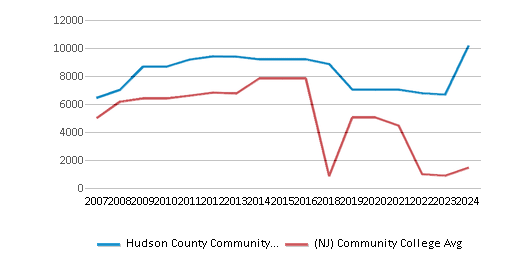
Student : Teacher Ratio
23:1
19:1
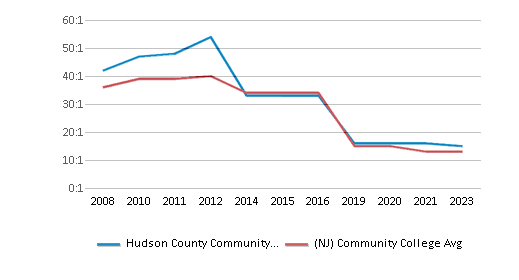
# Full-Time Students
4,330 students
699 students
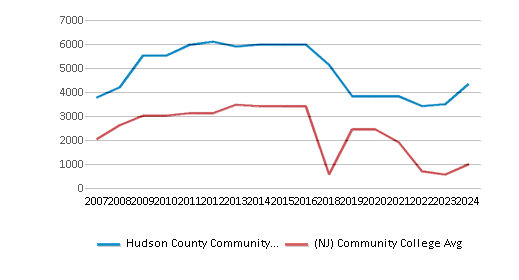
# Part-Time Students
5,839 students
1,319 students
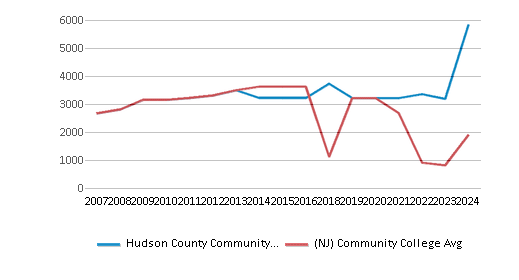
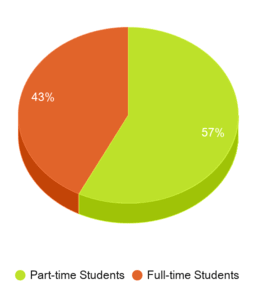
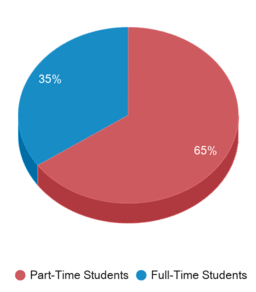
# Enrollment Undergraduate
101 students
327 students
# Full-Time Undergraduate Students
4,330 students
699 students
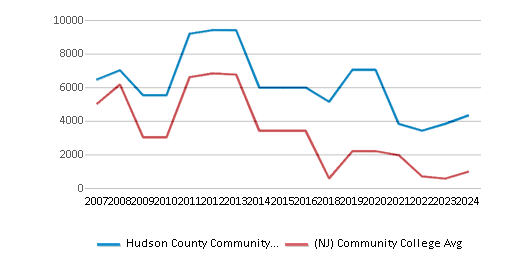
# Full-Time Graduate Students
n/a
50 students
# Part-Time Undergraduate Students
5,839 students
1,213 students
# Part-Time Graduate Students
n/a
6 students
Total Dormitory Capacity
n/a
20 students
% American Indian/Alaskan
n/a
n/a
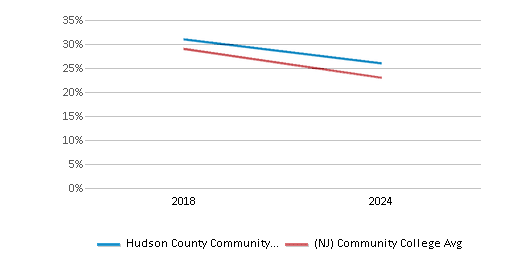
% Asian
8%
8%
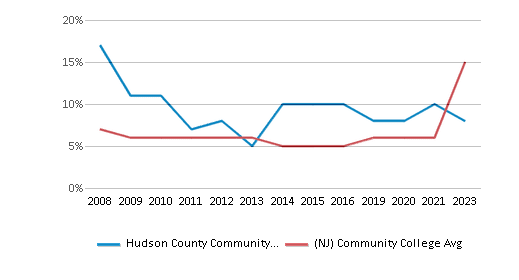
% Hispanic
51%
26%
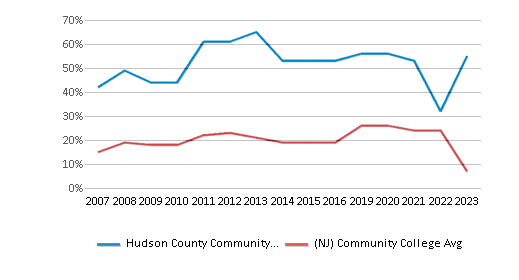
% Black
13%
15%
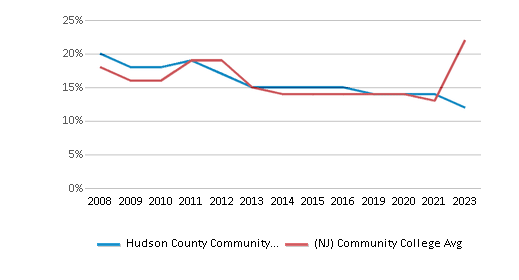
% White
13%
35%
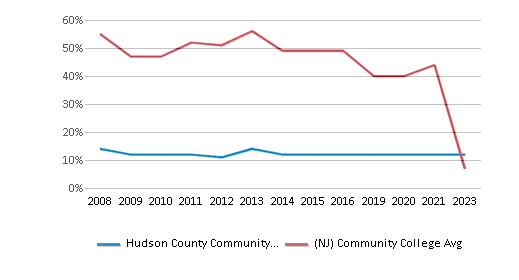
% Hawaiian
n/a
1%
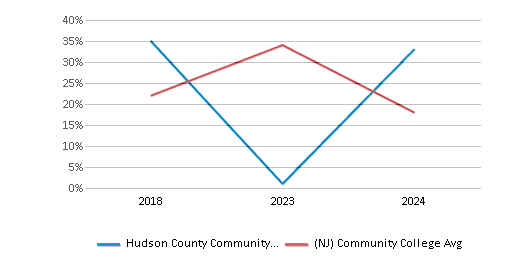
% Two or more races
2%
3%
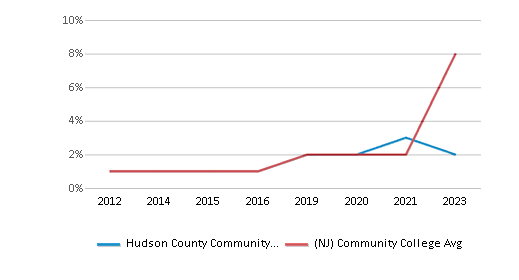
% Non Resident races
2%
2%
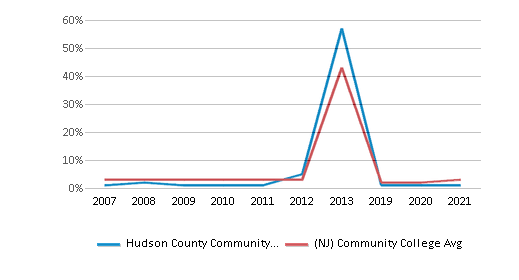
% Unknown races
10%
10%
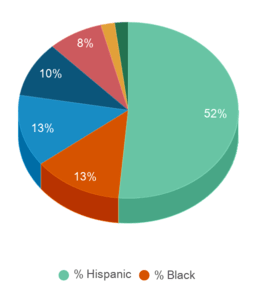
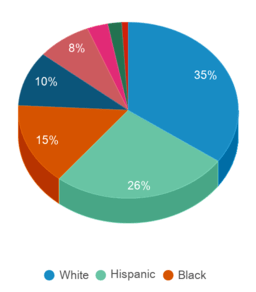
Diversity Score
0.70
0.77
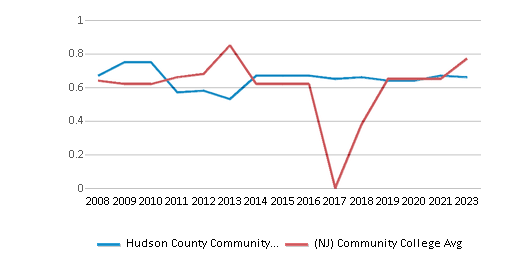
College Completion Rate (Students who graduate in less than 4 years)
0.1738%
0.3963%
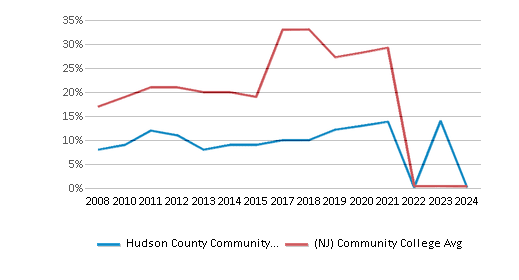
College Completion Rate (Students who graduate in 4 years or more than 4 years)
n/a
0.42%
Average Graduate Earnings (10 Years)
$32,700
$36,100
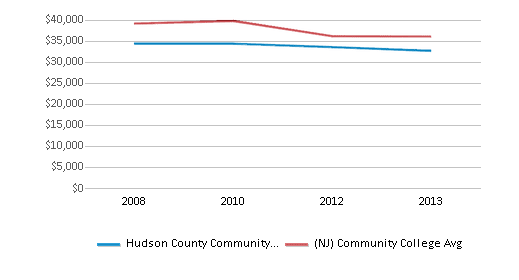
Tuition and Acceptance Rate
The public in-state tuition of $5,020 is less than the state average of $5,470. The in-state tuition has declined by 40% over four years.
The public out-state tuition of $8,740 is more than the state average of $7,575. The out-state tuition has declined by 25% over four years.
In-State Tuition Fees
$5,020
$5,470
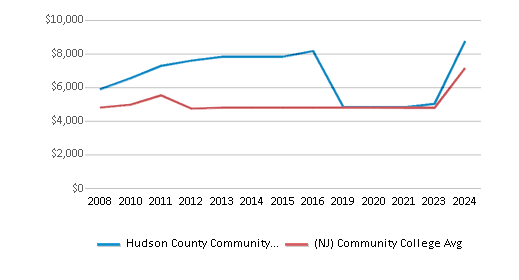
Out-State Tuition Fees
$8,740
$7,575
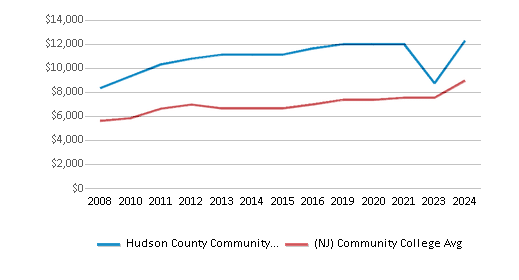
Tuition Notes
* county resident rate for 12 credits/semester
% Students Receiving Some Financial Aid
83%
87%
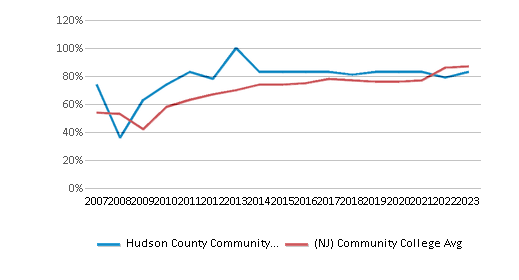
Median Debt for Graduates
$9,875
$11,000
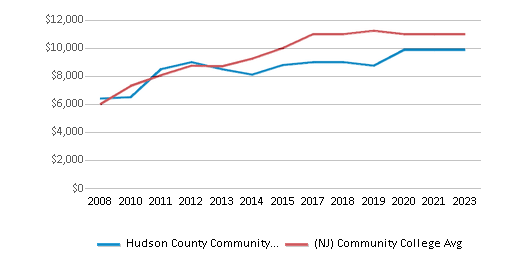
Median Debt for Dropouts
$5,100
$5,500
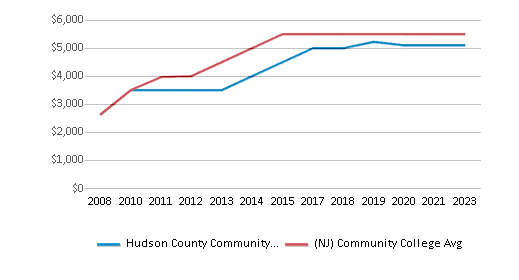
Acceptance Rate
n/a
76%
Extracurriculars
Total ExtracurricularsTotal Extra-curric.
28 extracurriculars
ExtracurricularsExtra-curric.
Club or Organization:
Active Minds, Art Club, Business and Accounting Club, C.A.R.E. Club (Nursing), Chi Alpha Epsilon (Honor Society), Computer Science Club, Criminal Justice Club, Culinary Arts Club, Enviromental Club, Gaming Central Club, Honors Student Council, Hospitality Club, Human Services Club, LGBTQIA Club, Literary Club, Model United Nations, Music Club, National Society of Leadership and Success, Phi Theta Kappa Honor Society, Poetry Club, Psi Beta (Psychology Honor Society), Psychology Club, Sigma Kappa Delta (English Honor Society), STEM Club, Student Government Association, Teacher Education Club, The Orator (Student Newspaper), Theater Arts Club
Active Minds, Art Club, Business and Accounting Club, C.A.R.E. Club (Nursing), Chi Alpha Epsilon (Honor Society), Computer Science Club, Criminal Justice Club, Culinary Arts Club, Enviromental Club, Gaming Central Club, Honors Student Council, Hospitality Club, Human Services Club, LGBTQIA Club, Literary Club, Model United Nations, Music Club, National Society of Leadership and Success, Phi Theta Kappa Honor Society, Poetry Club, Psi Beta (Psychology Honor Society), Psychology Club, Sigma Kappa Delta (English Honor Society), STEM Club, Student Government Association, Teacher Education Club, The Orator (Student Newspaper), Theater Arts Club
Source: 2024 (or latest year available) Integrated Postsecondary Education Data System (IPEDS) , School Administrators
School Notes
- When the New Jersey Board of Higher Education approved the establishment of a community college commission in Hudson County in September, 1974, the Commission became the first agency of its kind in the country. In the Spring of 1981, the Institution's official name became Hudson County Community College. Over the past decade, the credit enrollment has grown to more than 9,000 students, and not-for-credit enrollments have increased more than 10 times. The curricula have been revised and expanded to include more and stronger transfer and career programs, including a Paramedic Science degree program launched last semester. The College has established a centralized counseling program, and reorganized student government/student activities programs provide a strong co-curricular supplement to academic programs. Hudson County Community College offers a full range of associate-degree and certificate programs, many of which may lead to immediate employment. Students may select courses of study in Allied Health, Business, Computer Science, Culinary Arts, Education, Engineering/Technology, Liberal Arts and Social Sciences. HCCC's chapter of the international Phi Theta Kappa honor society is a source of special pride for the College and has earned national and statewide recognition for excellence. The Center for Business and Industry has been established to provide contract training for county employers and local businesses. A recently established Division of Technology and Instructional Support Services is implementing ambitious plans to incorporate state-of-the-art technology into the classroom and workplace.
Frequently Asked Questions
How much does Hudson County Community College cost?
Hudson County Community College's tuition is approximately $5,020 for In-State students and $8,740 for Out-State students.
What is Hudson County Community College's ranking?
Hudson County Community College ranks among the top 20% of community college in New Jersey for: Largest student body and Most Programs Offered.
In what neighborhood is Hudson County Community College located?
Hudson County Community College is located in the Journal Square neighborhood of Jersey City, NJ. There are 1 other community '.college.' located in Journal Square.
Recent Articles

Obtaining Your Bachelor's Degree at a Community College
Explore the evolving landscape of community colleges offering bachelor's degrees, addressing affordability, accessibility, and workforce needs.

A to Z of Community College Certificates and Courses
From business and healthcare to technology and skilled trades, the article showcases the breadth of options available to students seeking to enhance their knowledge, develop new skills, or pursue career advancement.

What is a Community College?
This comprehensive guide explains what a community college is, its history, and its role in higher education. It covers the types of programs offered, differences from four-year colleges, benefits of attending, and important considerations for prospective students, providing valuable insights for those exploring educational options.

